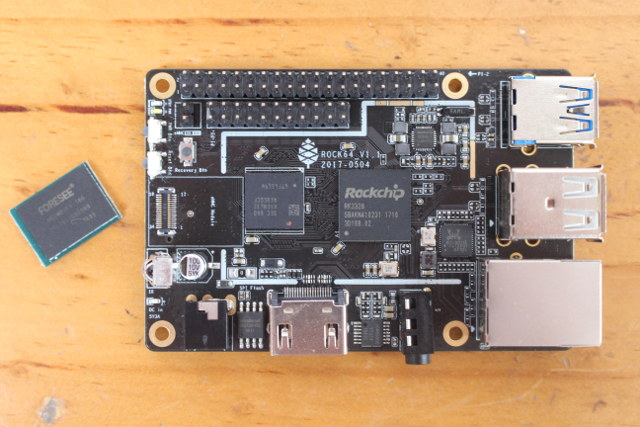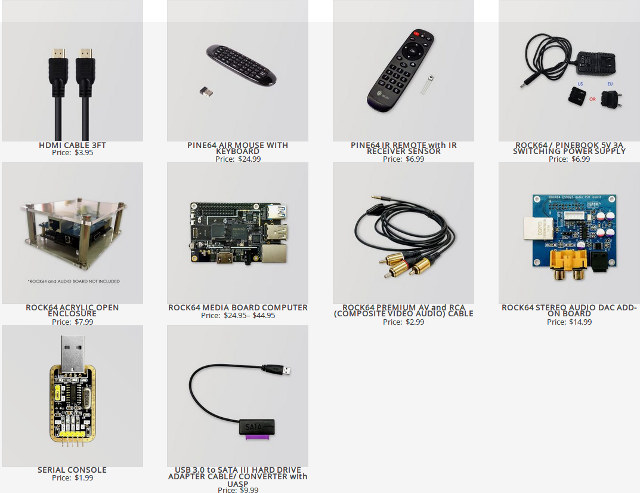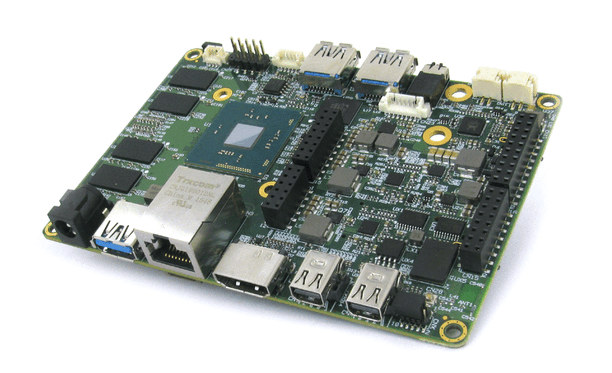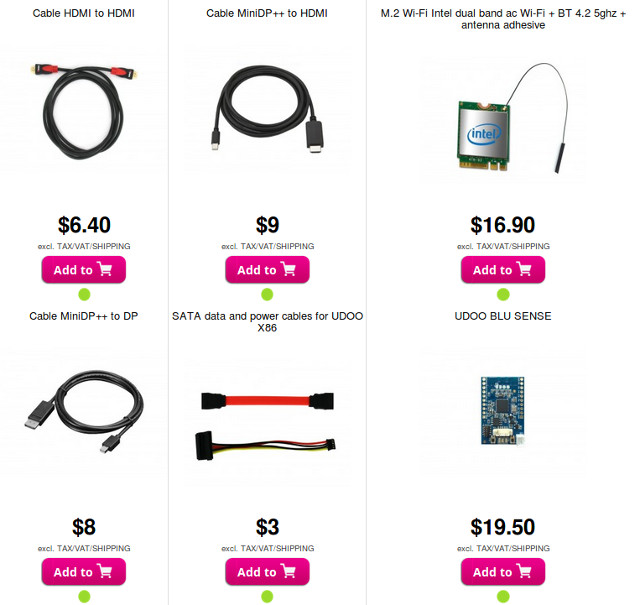Pine64 ROCK64 is a development board powered by Rockchip RK3328 quad core processor, while UDOO X86 board is based on Intel Atom x5-E8000 or Celeron N3160 processor plus a Quark SE MCU. What do they have common? Not much, except both boards are now officially available for sale.

Just a quick reminder of the specifications for ROCK64 board:
- SoC – Rockchip RK3328 quad core Cortex A53 processor with ARM Mali-450MP2 GPU
- System Memory – 1, 2, or 4 GB LPDDR3
- Storage – eMMC flash module socket + micro SD card slot + 128 Mbit SPI flash
- Video & Audio Output – HDMI 2.0a up to 4K @ 60 Hz with HDR10 and HLG support, 3.5mm AV port (composite video + stereo audio)
- Video Codec – 4K VP9, H.265 and H.264, 1080p VC-1, MPEG-1/2/4, VP6/8
- Connectivity – Gigabit Ethernet
- USB – 2x USB 2.0 ports, 1x USB 3.0 port
- Expansion Headers
- 40-pin Pi-2 Bus with GPIOs, 2x I2C, Analog inputs, UART, SPI, and power signals (5V, 3.3V, and GND)
- 22-pin Pi-P5+ Bus with GPIOs, I2S, S/PDIF, Ethernet, and power signals (5V, 3.3V, and GND)
- Misc – IR receiver; power, recovery & reset buttons; eMMC jumper
- Power Supply – 5V/3A via 3.5mm/1.35mm power barrel
- Dimensions – 85 x 56 mm

What we did not know at the announcement where the price, and as expected the board is competitively priced at $24.95 with 1GB RAM, $34.95 with 2GB RAM, and $44.95 with 4GB RAM. Those price do not include shipping, and the boards are scheduled to ship on July 31st. The company is also offering several accessories for the board with remote controls, various cables, a case, a power supply kit, and an audio DAC add-on board.
 UDOO X86 boards have been available since last year, but only through Kickstarter, and the company has now announced the boards were available for direct purchase. There are now four versions of the board, namely Basic, Advanced, Advanced Plus and Ultra with the following specifications:
UDOO X86 boards have been available since last year, but only through Kickstarter, and the company has now announced the boards were available for direct purchase. There are now four versions of the board, namely Basic, Advanced, Advanced Plus and Ultra with the following specifications:
- SoC
- Basic – Intel Atom x5-E8000 quad core processor @ 1.04 / 2.0 GHz GHz with 12EU Intel HD graphics @ 320 MHz (5W TDP)
- Advanced / Advanced Plus – Intel Celeron N3160 quad-core processor @ 1.6 GHz / 2.24 GHz (Turbo) with 12EU Intel HD graphics@ 320 MHz/640Mhz (4W SDP / 6W TDP)
- Ultra – Intel Pentium N3710 quad core processor @ 1.60 / 2.56 GHz with 16EU Intel HD 405 graphics @ 400 / 700 MHz (4W SDP / 6W TDP)
- System Memory
- Basic – 2 GB DDR3L
- Advanced – 4GB DDR3L dual channel
- Ultra – 8GB DDR3L dual channel
- Storage
- SATA connector, M.2 key B SSD slot, and micro SD card slot
- Advanced Plus & Ultra only – 32GB eMMC flash
- Video Output – 1x HDMI port with CEC support, 2x mini DisplayPort++ (Dual-mode DisplayPort)
- Audio I/O – HDMI, mini DP, microphone and headphone combo connector, speaker header, and S/PDIF output; ALC283CG audio codec
- Video Codec
- Decode – H.265/HEVC, H.264, MPEG-2, MVC, VC-1, WMV9, VP8
- Encode – H.264, MVC, JPEG
- Connectivity – Gigabit Ethernet, optional 802.11ac WiFi and Bluetooth 4.0 using M.2 slot
- USB – 3x USB 3.0 host ports
- Serial – 2x UART ports on interrupt pin headers
- Headers (for quad core processor) – Up to 28 external GPIOs, LPC, 2x I2C, GPIOs, touch screen I/F
- Arduino part:
- Intel Curie module with Intel Quark SE @ 32 MHz and 32-bit ARC core @ 32 MHz
- SPI flash
- Bluetooth LE
- 6-axis accelerometer and gyroscope
- UDOO Bricks connector
- Arduino UNO headers (3.3V I/Os with protection against 5V over-voltage):
- 14 digital I/Os including 4 PWM
- 6x 10-bit analog inputs
- Misc – IR receiver
- Power Supply – 12V/3A
- Dimensions – 12 x 8.5 cm
The board can run Linux, Android, and Windows 10 operating systems. The prices excluding taxes, and shipping are:
- $125 for UDOO X86 Basic
- $149 for UDOO X86 Advanced
- $165 for UDOO X86 Advanced Plus
- $267 for UDOO X86 Ultra
There are also various cables, sensor boards, WiFi module, and other accessories, which you can purchase on UDOO X86 product page.


Jean-Luc started CNX Software in 2010 as a part-time endeavor, before quitting his job as a software engineering manager, and starting to write daily news, and reviews full time later in 2011.
Support CNX Software! Donate via cryptocurrencies, become a Patron on Patreon, or purchase goods on Amazon or Aliexpress




